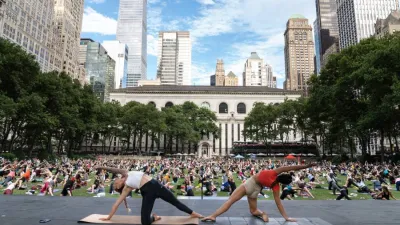Brendan Crain responds to recent criticism of placemaking as a counterproductive and superficial pursuit with a defense of the social and economic capital building elements that are the foundation, and outcome, of the process.
"For every person who thinks that you can ‘placemake’ unilaterally by dropping in cool amenities," says Crain in response to a recent post by Jim Russell at Burgh Diaspora, "there is another who believes that Placemaking is as much about the discussion that participants have with each other as it is about whether a space contains public art or picnic tables when all is said and done. The physical attributes of the space in question are important, but they are the means, not the end. If you’re not building social capital in the community where you’re working, you’re not Placemaking; you’re just reorganizing the furniture." He continues, "By bringing people together around a shared starting point to define and work toward shared goals, Placemaking can play a critical role in strengthening local economies."
"Like Russell, many people today are beginning to voice the concern that Placemaking is 'counterproductive' to economic development, because they’ve been led to believe that the process is simply about cutting and pasting things that worked somewhere else into struggling spaces. But great places and strong local economies are created in the same way: by getting people together to define local challenges and come up with appropriate solutions to address them."
FULL STORY: Challenges and Warts: How Physical Places Define Local Economies

Maui's Vacation Rental Debate Turns Ugly
Verbal attacks, misinformation campaigns and fistfights plague a high-stakes debate to convert thousands of vacation rentals into long-term housing.

Planetizen Federal Action Tracker
A weekly monitor of how Trump’s orders and actions are impacting planners and planning in America.

San Francisco Suspends Traffic Calming Amidst Record Deaths
Citing “a challenging fiscal landscape,” the city will cease the program on the heels of 42 traffic deaths, including 24 pedestrians.

Defunct Pittsburgh Power Plant to Become Residential Tower
A decommissioned steam heat plant will be redeveloped into almost 100 affordable housing units.

Trump Prompts Restructuring of Transportation Research Board in “Unprecedented Overreach”
The TRB has eliminated more than half of its committees including those focused on climate, equity, and cities.

Amtrak Rolls Out New Orleans to Alabama “Mardi Gras” Train
The new service will operate morning and evening departures between Mobile and New Orleans.
Urban Design for Planners 1: Software Tools
This six-course series explores essential urban design concepts using open source software and equips planners with the tools they need to participate fully in the urban design process.
Planning for Universal Design
Learn the tools for implementing Universal Design in planning regulations.
Heyer Gruel & Associates PA
JM Goldson LLC
Custer County Colorado
City of Camden Redevelopment Agency
City of Astoria
Transportation Research & Education Center (TREC) at Portland State University
Jefferson Parish Government
Camden Redevelopment Agency
City of Claremont





























